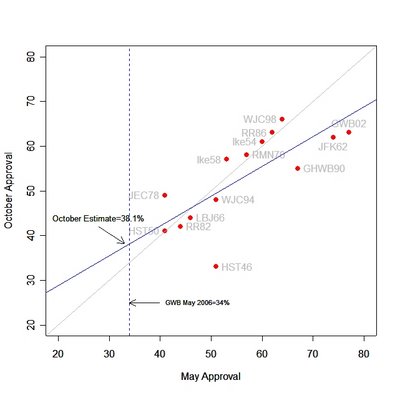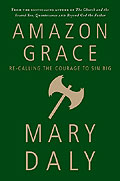 Bush's approval dips to 31% in the new USAToday/Gallup poll conducted May 5–7. Significantly, approval among Republicans weakened to 68%.
Bush's approval dips to 31% in the new USAToday/Gallup poll conducted May 5–7. Significantly, approval among Republicans weakened to 68%.
Compared to the five most recent presidents:
Bush has the widest gap between Republicans' and Democrats' approval ratings of any of the five presidents at the low points of their administration. There is a 64 point gap between Republicans' and Democrats' ratings of Bush right now. This compares with a 50 point partisan gap for Reagan, a 45 point gap for Clinton, a 45 point gap for the elder Bush, and a 15 point gap for Carter.George, you're doing a "heckuva job" as a "uniter."
Charles Franklin, professor of political science who teaches statistical analysis of polls, elections, and public opinion at the University of Wisconsin, provides a startling comparison of Bush's midterm ratings to previous presidents from 1950 forward (h/t to Mark Blumenthal). The professor's grafs:
If the current rate were sustained throughout the year, approval would stand at 20.4% on election day, below the all time low of 22% for Truman. (Gallup cites 23% as Truman's low, and they should know, but there is a February 1952 Gallup poll that appears to show the 22% I cite. I'm trying to get this clarified. Either way Bush would be below Truman's record.)
If the rest of the year returned to the rate of most of 2005, -.0309 rather than -.0720, then election day approval would be 28.1%.
If the president can rally and sustain the same rate as during November-January, then election day approval would be 40.8%.
Sustained improvement in presidential approval has not been seen in the Bush administration except during the 2004 election campaign period. From 5/1/2004 through 11/2/2004 approval rose at a rate of +0.0112% per day (or +1% every 89 days.) At that rate, approval at the midterm would stand at 36.1%.
And, of course, if approval simply stabilizes at the current level, approval would be 34% on election day.
Approval can surge dramatically, as the aftermath of 9/11 and the start of the Iraq war illustrate. However, such surges commonly accompany dramatic international events and not new domestic initiatives. By their nature, such events are unpredictable. The surge in support is also usually short-lived.
I was frankly shocked at the above results. Other presidents have suffered low approval ratings, and President Bush still stands above the lows of four of the ten other post-war presidents. But I had not appreciated how much the current approval is below other mid-term approval ratings, even without extrapolating current trends. We have simply never seen a president this unpopular going into a midterm election.
I will be surprised if the current rate of decline continues. But I will also be surprised by a sustained upturn at the rate of November-January. Either would be an extreme outcome. But approval between the upper 20s and lower 30s seems entirely plausible. There is no precedent for a midterm with approval at those levels.A commenter took exception with Franklin's analysis since he started with 1950 and didn't include Truman's dive in post-war 1946. So amending his data to factor in Truman's poor approvals, Franklin restated that there's "almost no precedent for a midterm with approval at those levels." Blumenthal warned that Bush wouldn't want to share Truman's 1946 low at 33% since that year, the opposition party, the Republicans, "won 55% of the congressional vote and took control of both houses of Congress and a majority of state governorships."
Franklin also posted some nifty charts so click the link. Here's one, a projection of how Bush's October approval ratings might look based on May ratings:

The picture isn't pretty at 38.1%. Yet, Franklin predicts, based on the past 16 months, that Bush's approval ratings in October will measure "in the high 20s to low 30s."
Franklin also examined the new Gallup poll that I quoted at the top of this post and he cites "conservative discontent" for the erosion of the president's ratings with Republicans. Hmm, causes me to wonder if the Bush camp plans an extraordinary event or series of crises to rally the base. It could happen.























|